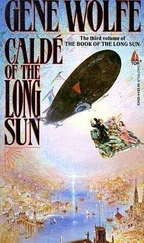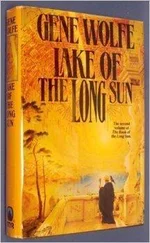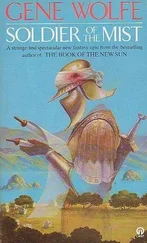Gene Wolfe - Nightside the Long Sun
Здесь есть возможность читать онлайн «Gene Wolfe - Nightside the Long Sun» весь текст электронной книги совершенно бесплатно (целиком полную версию без сокращений). В некоторых случаях можно слушать аудио, скачать через торрент в формате fb2 и присутствует краткое содержание. Жанр: Фантастика и фэнтези, на английском языке. Описание произведения, (предисловие) а так же отзывы посетителей доступны на портале библиотеки ЛибКат.
- Название:Nightside the Long Sun
- Автор:
- Жанр:
- Год:неизвестен
- ISBN:нет данных
- Рейтинг книги:5 / 5. Голосов: 1
-
Избранное:Добавить в избранное
- Отзывы:
-
Ваша оценка:
- 100
- 1
- 2
- 3
- 4
- 5
Nightside the Long Sun: краткое содержание, описание и аннотация
Предлагаем к чтению аннотацию, описание, краткое содержание или предисловие (зависит от того, что написал сам автор книги «Nightside the Long Sun»). Если вы не нашли необходимую информацию о книге — напишите в комментариях, мы постараемся отыскать её.
Nightside the Long Sun — читать онлайн бесплатно полную книгу (весь текст) целиком
Ниже представлен текст книги, разбитый по страницам. Система сохранения места последней прочитанной страницы, позволяет с удобством читать онлайн бесплатно книгу «Nightside the Long Sun», без необходимости каждый раз заново искать на чём Вы остановились. Поставьте закладку, и сможете в любой момент перейти на страницу, на которой закончили чтение.
Интервал:
Закладка:
He tossed the ball into his right hand and thrust his left into his pocket. The cards were still there: one, two, three. Many men in this quarter who worked from shadeup to dark—carrying bricks or stacking boxes, slaughtering, hauling like oxen or trotting beneath the weighty litters of the rich, sweeping and mopping—would be fortunate to make three cards a year. His mother had received six, enough for a woman and a child to live decently, from some fund at the fisc that she had never explained, a fund that had vanished with her life. She would be unhappy now to see him in this quarter, walking its streets as poor as many of its people. She had never been a happy woman in any case, her large dark eyes so often bright with tears from sources more mysterious than the fisc, her tiny body shaken with sobs that he could do nothing to alleviate.
(“Oh, Silk! My poor boy! My son!”)
He had at first called Blood sir, and afterward, my son, himself scarcely conscious of the change. But why? Sir because Blood had been riding in a floater, of course; only the richest of men could afford to own floaters. My son afterward. “The old cull’s dead, then?… It doesn’t make a bad bit’s difference to us, does it, Patera?… Nice of him.” Blood’s choice of word and phrase, and his almost open contempt for the gods, had not accorded with the floater; he had spoken better—far better—than most people in this quarter; but not at all like the privileged, well-bred man whom Silk would have expected to find riding in a private floater.
He shrugged, and extracted the three cards from his pocket.
There was always a good chance that a card (still more, a cardbit) would be false. There was even a chance, as Silk admitted to himself, that the prosperous-looking man in the floater—that this odd man Blood—kept false cards in a special location in his card case. Nevertheless all three of these appeared completely genuine, sharp-edged rectangles two thumbs by three, their complex labyrinths of gold encysted in some remarkable substance that was almost indestructible, yet nearly invisible. It was said that when two of the intricate golden patterns were exactly alike, one at least was false. Silk paused to compare them, then shook his head and hurried off again in the direction of the market. If these cards were good enough to fool the sellers of animals, that was all that mattered, though he would be a thief. A prayer, in that case, to Tenebrous Tartaros, Pas’s elder son, the terrifying god of night and thieves.
Maytera Marble sat watching, at the back of her class. There had been a time, long ago, when she would have stood, just as there had been a time when her students had labored over keyboards instead of slates. Today, now—in whatever year this might be … Might be …
Her chronological function could not be called; she tried to remember when it had happened before.
Maytera Marble could call a list of her nonfunctioning or defective components whenever she chose, though it had been five years or fifty since she had so chosen. What was the use? Why should she—why ever should anyone—make herself more miserable than the gods had chosen to make her? Weren’t the gods cruel enough, deaf to her prayers through so many years, so many decades and days and languid, half-stopped hours? Pas, Great Pas, was god of mechanisms, as of so much else. Perhaps he was too busy to notice.
She pictured him as he stood in the manteion, as tall as a talus, his smooth limbs carved of some white stone finer grained than shiprock—his grave, unseeing eyes, his noble brows. Have pity on me, Pas, she prayed. Have pity on me, a mortal maid who calls upon you now, but will soon stop forever.
Her right leg had been getting suffer and suffer for years, and at times it seemed that even when she sat so still—
A boy to a girl: “She’s asleep!”
—that when she sat as still as she was sitting here, watching the children take nineteen from twenty-nine and get nine, add seven and seventeen and arrive at twenty-three—that when she sat so still as this, her vision no longer as acute as it Once had been, although she could still see the straying, chalky numerals on their slates when the children wrote large, and all children their age wrote large, though their eyes were better than her own.
It seemed to her that she was always on the point of overheating any more, in hot weather anyway. Pas, Great Pas, God of Sky and Sun and Storm, bring the snow! Bring the cold wind!
This endless summer, without snow, with no autumn rains and the season for them practically past now, the season for snow nearly upon us, and no snow. Heat and dust and clouds that were all empty, yellow haze. What could Pas, Lord Pas, Husband of Grain-bearing Echidna and Father of the Seven, be thinking of?
A girl: “Look—she’s asleep!”
Another: “I didn’t think they slept.”
A knock at the Sun Street door of the palaestra.
“I’ll get it!” That was Asphodella’s voice.
This was Ratel’s. “No, I will!”
Fragrant white blossoms and sharp white teeth. Maytera Marble meditated upon names. Flowers—or plants of some kind, at least—for bio girls; animals or animal products for bio boys. Metals or stones for us.
Both together: “Let me!”
Her old name had been—
Her old name had been …
A crash, as a chair fell. Maytera Marble rose stiffly, one hand gripping the windowsill. “Stop that this instant!”
She could bring up a list of her nonfunctioning and defective parts whenever she chose. She had not chosen to do so for close to a century; but from time to time, most often when the cenoby lay on the night side of the long sun, that list came up of itself.
“Aquifolia! Separate those two before I lose my temper.”
Maytera Marble could remember the short sun, a disk of orange fire; and it seemed to her that the chief virtue of that old sun had been that no list, no menu, ever appeared unbidden beneath its rays.
Both together: “Sib, I wanted—”
“Well, neither of you are going to,” Maytera Marble told them.
Another knock, too loud for knuckles of bone and skin. She must hurry or Maytera Rose might go, might answer that knock herself, an occasion for complaint that would outlast the snow. If the snow ever arrived.
“I am going to go myself. Teasel, you’re in charge of the class until I return. Keep them at their work, every one of them.” To give her final words more weight, Maytera Marble paused as long as she dared. “I shall expect you to name those who misbehaved.”
A good step toward the door. There was an actuator in her right leg that occasionally jammed when it had been idle for an hour or so, but it appeared to be functioning almost acceptably. Another step, and another. Good, good! Praise to you, Great Pas.
She stopped just beyond the doorway, to listen for an immediate disturbance, then limped down the corridor to the door.
A beefy, prosperous-looking man nearly as tall as Patera Silk had been pounding the panels with the carved handle of his walking stick.
“May every god favor you this morning,” Maytera Marble said. “How may I serve you?”
“My name’s Blood,” he announced. “I’m looking at the property. I’ve already seen the garden and so on, but the other buildings are locked. I’d like you to take me through them, and show me this one.”
“I couldn’t possibly admit you to our cenoby,” Maytera Marble said firmly. “Nor could I permit you to enter the manse alone. I’ll be happy to show you through our manteion and this palaestra—provided that you have a valid reason for wishing to see them.”
Blood’s red face became redder still. “I’m checking the condition of the buildings. All of them need a lot of work, from what I’ve seen outside.”
Читать дальшеИнтервал:
Закладка:
Похожие книги на «Nightside the Long Sun»
Представляем Вашему вниманию похожие книги на «Nightside the Long Sun» списком для выбора. Мы отобрали схожую по названию и смыслу литературу в надежде предоставить читателям больше вариантов отыскать новые, интересные, ещё непрочитанные произведения.
Обсуждение, отзывы о книге «Nightside the Long Sun» и просто собственные мнения читателей. Оставьте ваши комментарии, напишите, что Вы думаете о произведении, его смысле или главных героях. Укажите что конкретно понравилось, а что нет, и почему Вы так считаете.









